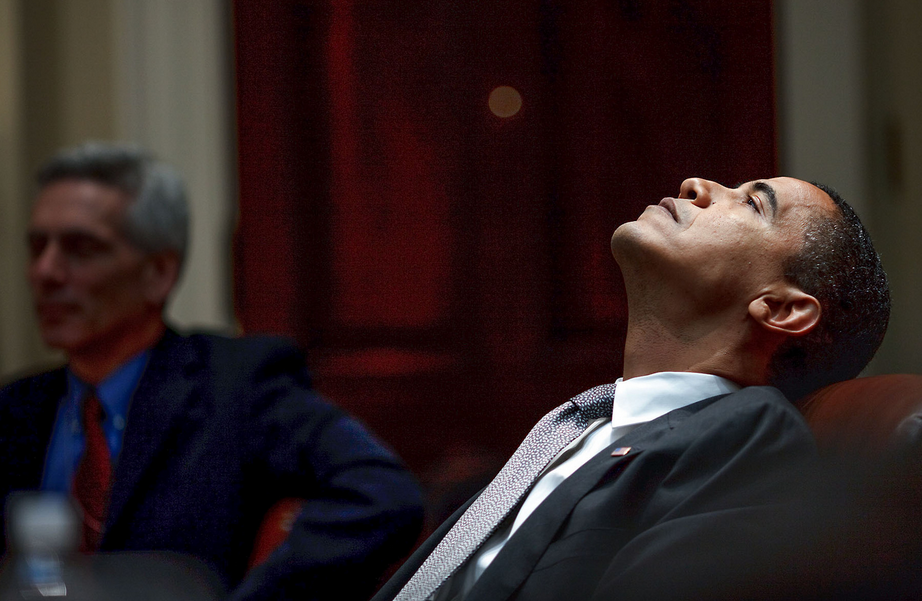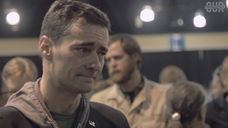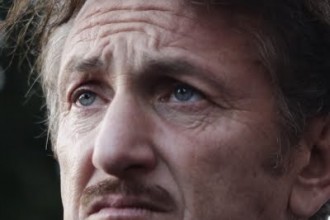David Bromwich’s “What Went Wrong” in Harper’s Magazine this month powerfully reminds us of a couple of things:
1. Not making a decision is still deciding something.
2. The role of the President is foreign policy. Full stop.
3. Rather than jumping into the ring with the candidates let’s reflect on the last 7 years, what happened and what’s important to recognize and learn from to better inform our choice for President in 2016.
Last week, we saw several attempts by the media to define our US foreign policy, or lack thereof. Check out these two articles from Time Magazine – one is titled “Reasons Why the U.S. Remains the World’s Only Superpower,” and the other argues that Obama is proving his critics right and isn’t fulfilling his promises to the American people.
This Harper’s piece offers a detailed, thorough review of domestic and foreign policy and a high level of understanding what it takes to be President.
It deconstructs the decisions that weren’t made and concludes that a lot of experience is needed to actually deliver on promises made during a campaign.
“One of the least controversial things you can say about Barack Obama is that he campaigned better than he has governed.”
The piece starts by chronically a naïveté in Obama’s unwillingness to play politics. His lack of experience in Washington translated into a bravado unpopular with others, even in his own party. This article paints a picture that reminds us of being seniors in high school, observing freshmen out at their first party. They want to fit, to be cool, to act like they know how to drink, but they don’t have a clue what was going on, and their eagerness to fit in makes them stick out. Obama thought his climb was over. He’d reached the executive office by promising to close Guantanamo and to clamp down on domestic spying, but he didn’t know enough to make those promises. This was his first chance for a beer at his very first party, and when he found himself puking in the bathroom, he didn’t exactly take responsibility for his ignorance.
“Yet as recently as March of this year, Obama spoke as if the continued existence of the prison were an accident that bore no relation to his own default. ‘I thought we had enough consensus where we could do it in a more deliberate fashion,’ he said. ‘But the politics of it got tough, and people got scared by the rhetoric around it. Once that set in, then the path of least resistance was just to leave it open, even though it’s not who we are as a country and it’s used by terrorists around the world to help recruit jihadists.’ One may notice a characteristic evasion built in to the grammar of these sentences. ‘The politics’ (abstract noun) ‘got tough’ (nobody can say why) ‘and people’ (all the people?) ‘got scared’ (by whom and with what inevitability?). Adverse circumstances ‘set in’ (impossible to avoid because impossible to define). In short, once the wrong ideas were planted, the president could scarcely have done otherwise.”
“The crucial phrase is ‘the path of least resistance.’ In March 2015, in the seventh year of his presidency, Barack Obama was presenting himself as a politician who followed the path of least resistance. This is a disturbing confession. It is one thing to know about yourself that in the gravest matters you follow the path of least resistance. It is another thing to say so in public. Obama was affirming that for him there could not possibly be a question of following the path of courageous resistance. He might regret it six years later, but politics set in, and he had to leave Guantánamo open — a symbol of oppression that (by his own account) tarnished the fame of America in the eyes of the world.”
Much of the blame is placed at a lack of experience. Obama, the great orator, inspired people with his words, and people in turn made exception for him.
“They made the allowance because he cut a brilliant figure. Obama’s ascent was achieved too easily to be answerable for the requirement of performing much. This held true in law school, where he was elected president of the Harvard Law Review without an article to his name, and again in his three terms as an Illinois state senator, where he logged an uncommonly high proportion of noncommittal “present” votes rather than “ayes” or “nays.” Careless journalists have assumed that his time of real commitment goes further back, to his three years as a community organizer in Chicago. But even in that role, Obama was averse to conflict. “
When you’re scared to make a decision, it’s like you’re in purgatory, and purgatory is still an experience. We can’t escape conflict by avoiding it. When we select our next president, we should consider this lesson: If you haven’t had top clearance, if you haven’t made tough decisions and been forced to stand by your record, you may not be ready to lead the world’s super power. Nothing personal, you just need more experience in the ring.
“He came to the presidency, then, without having made a notable sacrifice for his views. Difficulty, however — the kind of difficulty Obama steered clear of — can be a sound instructor. Stake out a lonely position and it sharpens the outline of your beliefs. When the action that backs the words is revealed with all its imperfections, the sacrifice will tell the audience something definite and interesting about the actor himself. Barack Obama entered the presidency as an unformed actor in politics.”
This piece details how Obama publicly reprimanded AIG and J.P. Morgan, Goldman and so on for their corrupt business practices, while his actions categorically protected the “fat cats” he told us all he had “no use for.” He also seemed to get the big foreign policy agendas backwards, we can assume because he didn’t have the real data.
Obama campaigned on a platform that stated: Afghanistan was where we needed to fight, not Iraq. By 2009, Obama knew this was inaccurate. We learn our ambassador in Afghanistan, the most knowledgable person of the state of affairs there, wrote urging the President to close the curtain on the Afghan theater. Obama ignored him.
“Two incidents might have been seized on by a leader with an eye for a political opening. The first arrived in the form of diplomatic cables sent to the State Department in early November 2009 by Karl W. Eikenberry, the ambassador to Afghanistan and, before that, the senior commander of U.S. forces there. Eikenberry’s length of service and battlefield experience made him a more widely trusted witness on Afghanistan than General David Petraeus; his cables said that the war could not be won outside the parts of the country already held by U.S. forces. No more troops ought to be added. Eikenberry recommended, instead, the appointment of a commission to investigate the state of the country. Any reasonably adroit politician would have made use of these documents and this moment. With a more-in-sorrow explanation, such a leader could have announced that the findings, from our most reliable observer on the ground, compelled a reappraisal altogether different from the policy that had been anticipated in 2008. Though Obama had his secretary of state, Hillary Clinton; his secretary of defense, Robert Gates; and the chairman of the joint chiefs, Michael Mullen, arrayed against him, he also had opponents of escalation, including Vice President Biden and others, at the heart of his policy team. He chose to do nothing with the cables. A lifeline was tossed to him and he treated it as an embarrassment.”
This piece makes the case that the death of Osama bin Laden would have been another opportunity to close the shut down the shitshow in Afghanistan.
“If the Eikenberry cables afforded a chance to tell the unpopular truth no politician wants to utter — “We can’t win the war” — the death of bin Laden offered a prime opportunity to recite a comforting fiction to the same effect: “Al Qaeda is our enemy. It is now a greatly diminished force, and we have killed its leader. At last, after so much pain and sacrifice, we can begin to wind down the war on terror…The delay in withdrawing from Afghanistan was decisive and fatal, and it is now a certainty that we will have a substantial military presence in that country at the end of Obama’s second term.”
Bromwich makes the case that Obama’s lack of action is a pattern, one that is responsible for much of the trouble in our role in the world. He details this inability to make decisions in Obamas treatment of his most important domestic agenda, his Affordable Health Care Act. “Obama’s domestic policy has, for the most part, exhibited a pattern of intimation, postponement, and retreat.” With regards to ACA, “he has stayed aloof from negotiations, as if recusing himself afforded a certain protection against being blamed for failure.”
“But considering how much the result mattered — not just to his legacy but also to the trust in government he had pledged to restore — what could be the excuse for conversing face- to-face with the secretary of health and human services only once in the three and a half years before the unraveling?”
We learn in this piece about how Obama’s views changed as he was exposed to real data. As a politician running for president, he was terrific at promising to restore all that is good in the world. He was optimistic, shining the light of “change” in our desperate eyes. He vowed to change Washington from the old politics, from Hawkish, war-hungry, secrecy-loving old dogs to a younger, smarter, more diplomatic, constitutionalist approach. But then he went to What You Need To Know To Be President of the United States School… and he realized maybe the world isn’t such a friendly place after all.
“It now seems clear that during the presidential transition, between November 2008 and January 2009, Obama was effectively drilled in the intricacies of U.S. operations abroad, the secret deployment of special forces, the expansion of domestic spying by the NSA, and the full extent of terror threats both inside and outside the United States (as determined by the high officials of the security apparatus). More than might have been expected from a principled politician, he was set back on his heels. It would be understandable if he was also frightened.”
Through his use of contractors and drones the argument can be made that Obama not only followed in Cheney’s footsteps with regards to military initiatives, but actually ramped it up.
“In the manner of Cheney, Obama kept secret the document establishing the legal rationale for the strikes. By the end of 2014, Obama had ordered 456 drone attacks (compared with fifty-two by Bush). Unhappily, there is truth in the charge by Bush’s supporters that President Obama has spared himself the illegality of torture by killing the suspects whom his predecessor would have kidnapped for ‘enhanced interrogation.'”
The article details how mismanagement in Ukraine and Syria may be due to poor oversight and a product of a government that is too large to control. The idea of Deep State, where things are happening with in the State Department that the President is only privy to after the fact, sounds likely. “As in Libya, the evasion of responsibility has been hard to explain. It almost looks as if a cell of the State Department assumed the management of Ukraine policy and the president was helpless to alter their design.” When you don’t have control of one of your most important departments, in business, government, or elsewhere, it should be expected you’re going to lose even more control for no other reason than people don’t think you know what you’re doing.
“John Brennan gave substance to this surmise when he told Charlie Rose recently that the new president, in 2009, ‘did not have a good deal of experience’ in national security, but now ‘he has gone to school and understands the complexities.’ This is not the tone of a public servant talking about his superior. It is the tone of a schoolmaster describing an obedient pupil.”
This piece is an education in how we judge a two term president. We elected Obama with hope in our eyes. The nation was naïve, and the man we elected was naïve. Change will only happen when the players know the game and know how to slowly adjust the system. We are now a large, bureaucratic government with intertwined relationships that cannot be quickly altered. When we elect our next President, let’s consider the experience of the individuals more carefully. If someone in a middle school election swears they’ll hold recess all day and serve ice-cream for every lunch, most kids will know they’re full of it. Their promises sound great but won’t come to fruition. Let’s remember that when we vote in 2016.






